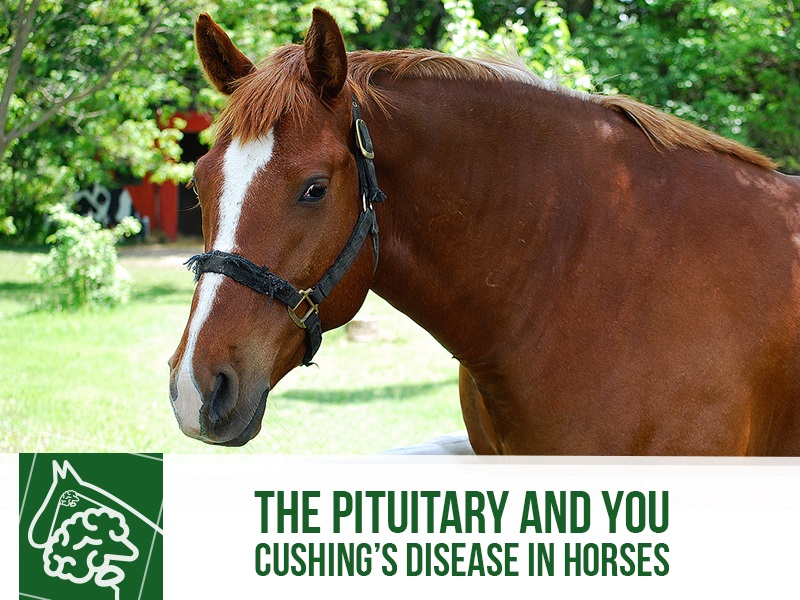
The Pituitary and You: Cushing's Disease in Horses

Do you own an older horse? Then this post is definitely for you. Neurodegenerative diseases that can afflict elderly humans, like Alzheimer's or Parkinson's, are fairly well known and this has proved to be true for our faithful horses as well.
Cushing's Disease is also called dysfunction of the pars intermedia of the pituitary gland. It's a much harder to remember name, but it's very handy at describing what this pathology is actually about.
The pituitary gland is a small gland in the nervous system that sits in a small bone protrusion on the floor of the skull. It's a very important gland as it works in tandem with the hypothalamus and produces an immense number of hormones that will affect organs and functions all over the body.
So, what does it do? A better question would be what doesn't it do! It helps regulate growth, the metabolism of carbs, lipids and proteins, kidney function, the immune system, milk production, stress responses and even the reproductive system.
The pituitary gland has 4 different sections, each with cells involved in the production of different hormones. One of them, the pars intermedia (plainly put, the middle portion of it) is the portion involved in this disease.
Unfortunately, we are not sure why Cushing's Disease happens in horses. Due to the destruction of the neurons responsible for producing dopamine, a neurotransmitter, the pituitary gland becomes unregulated and produces an excess of hormones in the pars intermedia. Why is there destruction of the dopaminergic inhibition system in the first place? We are not sure yet but we suspect oxidative stress may contribute to neuronal death.
How does all of this affect your horse? With the pituitary pumping out way more hormones than it needs, many organs downstream will be deregulated. You can find clinical signs like problems with shedding, hirsutism, atrophy of the muscles, laminitis, increased production of urine and water intake, sweating excessively, abnormal fat distribution, immunosuppression, changes in behaviour and infertility, among others.
Double unfortunately, the diagnosis is quite complex and it's very easy to get inconclusive results. This is in part because it's a progressive disease. Testing too early on will commonly end in false negatives, and because the pituitary has a fluctuating activity and is more active in the autumn, so testing during this period might net false positives.
Despite all of this, treatments do exist! Beyond addressing the issue in the pituitary, your buddy needs solid hoof and dental care, good nutritional management, tight parasite control and generally keeping a keen eye on any changes that might occur.
Think your horse might be suffering from Cushing's Disease? Give your vet a call and they'll help you figure out the best treatment plan for everyone.
Image via: "morganHead" by tintedglass, was built upon and is licensed under CC BY 2.0
Would you like to know more about horses? Check our Equine Courses:
Equine courses
Published: 05 May 2017
Read the previous article: How Environmental Enrichment Benefits Cats

